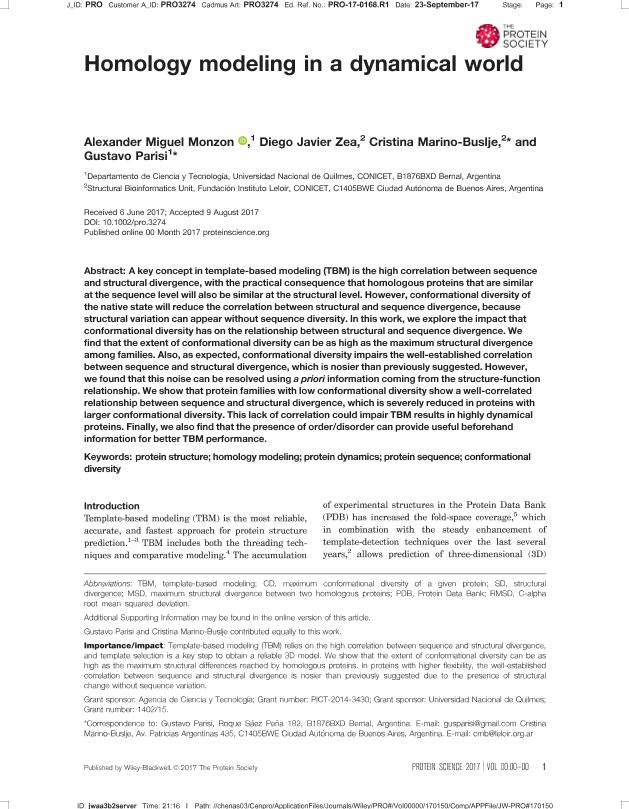Mostrar el registro sencillo del ítem
dc.contributor.author
Monzón, Alexander

dc.contributor.author
Zea, Diego Javier

dc.contributor.author
Marino, Cristina Ester

dc.contributor.author
Parisi, Gustavo Daniel

dc.date.available
2018-04-09T19:25:13Z
dc.date.issued
2017-11
dc.identifier.citation
Monzón, Alexander; Zea, Diego Javier; Marino, Cristina Ester; Parisi, Gustavo Daniel; Homology modeling in a dynamical world; John Wiley & Sons Inc; Protein Science; 26; 11; 11-2017; 2195-2206
dc.identifier.issn
0961-8368
dc.identifier.uri
http://hdl.handle.net/11336/41402
dc.description.abstract
A key concept in template‐based modeling (TBM) is the high correlation between sequence and structural divergence, with the practical consequence that homologous proteins that are similar at the sequence level will also be similar at the structural level. However, conformational diversity of the native state will reduce the correlation between structural and sequence divergence, because structural variation can appear without sequence diversity. In this work, we explore the impact that conformational diversity has on the relationship between structural and sequence divergence. We find that the extent of conformational diversity can be as high as the maximum structural divergence among families. Also, as expected, conformational diversity impairs the well‐established correlation between sequence and structural divergence, which is nosier than previously suggested. However, we found that this noise can be resolved using a priori information coming from the structure‐function relationship. We show that protein families with low conformational diversity show a well‐correlated relationship between sequence and structural divergence, which is severely reduced in proteins with larger conformational diversity. This lack of correlation could impair TBM results in highly dynamical proteins. Finally, we also find that the presence of order/disorder can provide useful beforehand information for better TBM performance.
dc.format
application/pdf
dc.language.iso
eng
dc.publisher
John Wiley & Sons Inc

dc.rights
info:eu-repo/semantics/openAccess
dc.rights.uri
https://creativecommons.org/licenses/by-nc-sa/2.5/ar/
dc.subject
Protein Structure
dc.subject
Homology Modeling
dc.subject
Protein Dynamics
dc.subject
Conformational Diversity
dc.subject.classification
Otras Ciencias Biológicas

dc.subject.classification
Ciencias Biológicas

dc.subject.classification
CIENCIAS NATURALES Y EXACTAS

dc.title
Homology modeling in a dynamical world
dc.type
info:eu-repo/semantics/article
dc.type
info:ar-repo/semantics/artículo
dc.type
info:eu-repo/semantics/publishedVersion
dc.date.updated
2018-04-09T15:04:59Z
dc.journal.volume
26
dc.journal.number
11
dc.journal.pagination
2195-2206
dc.journal.pais
Estados Unidos

dc.journal.ciudad
Hoboken
dc.description.fil
Fil: Monzón, Alexander. Consejo Nacional de Investigaciones Científicas y Técnicas; Argentina. Universidad Nacional de Quilmes. Departamento de Ciencia y Tecnología; Argentina
dc.description.fil
Fil: Zea, Diego Javier. Fundación Instituto Leloir; Argentina. Consejo Nacional de Investigaciones Científicas y Técnicas; Argentina
dc.description.fil
Fil: Marino, Cristina Ester. Consejo Nacional de Investigaciones Científicas y Técnicas; Argentina. Fundación Instituto Leloir; Argentina
dc.description.fil
Fil: Parisi, Gustavo Daniel. Consejo Nacional de Investigaciones Científicas y Técnicas; Argentina. Universidad Nacional de Quilmes. Departamento de Ciencia y Tecnología; Argentina
dc.journal.title
Protein Science

dc.relation.alternativeid
info:eu-repo/semantics/altIdentifier/url/https://onlinelibrary.wiley.com/doi/abs/10.1002/pro.3274
dc.relation.alternativeid
info:eu-repo/semantics/altIdentifier/doi/http://dx.doi.org/10.1002/pro.3274
Archivos asociados
